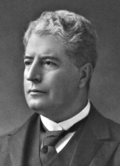Barton ministry | |
|---|---|
| 1st Ministry of Australia | |
 Governor-General Lord Hopetoun with first arrangement of newly appointed ministers to the Barton ministry on 1 January 1901. Sir James Dickson (fifth standing to the left) died nine days later. | |
| Date formed | 1 January 1901 |
| Date dissolved | 24 September 1903 |
| People and organisations | |
| Monarch | Victoria Edward VII |
| Governor-General | Lord Hopetoun Lord Tennyson |
| Prime Minister | Sir Edmund Barton |
| No. of ministers | 11 |
| Member party | Protectionist |
| Status in legislature | Minority government (Labour support) |
| Opposition party | Free Trade |
| Opposition leader | George Reid |
| History | |
| Election | 29–30 March 1901 |
| Legislature term | 1st |
| Successor | First Deakin ministry |
| ||
|---|---|---|
Personal
1st Prime Minister of Australia Electoral history | ||
The Barton ministry (Protectionist) was the 1st ministry of the Government of Australia. It was led by the country's 1st prime minister, Sir Edmund Barton. The Barton ministry was formed on 1 January 1901 when Federation took place. The ministry was replaced by the First Deakin ministry on 24 September 1903 following Barton's retirement from Parliament to enter the inaugural High Court. [1]
James Drake, who died in 1941, was the last surviving member of the Barton ministry; Drake was also the last surviving minister of the First Deakin ministry and the Reid government. Elliot Lewis was the last surviving member of the inaugural Barton ministry.














